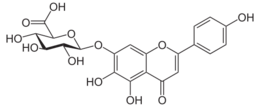Chemistry:Scutellarin

| |
| Names | |
|---|---|
| IUPAC name
4′,5,6-Trihydroxy-4-oxoflav-2-en-7-yl β-D-glucopyranosiduronic acid
| |
| Systematic IUPAC name
(2S,3S,4S,5R,6S)-6-{[5,6-Dihydroxy-2-(4-hydroxyphenyl)-4-oxo-4H-1-benzopyran-7-yl]oxy}-3,4,5-trihydroxyoxane-2-carboxylic acid | |
| Other names
Breviscapine; Breviscapin; Scutellarein-7-glucuronide; Scutellarein-7beta-D-glucuronide; Scutellarein-7beta-D-glucuronoside; Scutellarein-7-O-beta-D-glucuronide; 7-(β-D-glucopyranuronosyloxy)-5,6-dihydroxy-2-(4-hydroxyphenyl)-4H-1-benzopyran-4-one
| |
| Identifiers | |
3D model (JSmol)
|
|
| ChEBI | |
| ChEMBL | |
| ChemSpider | |
PubChem CID
|
|
| UNII | |
| |
| |
| Properties | |
| C21H18O12 | |
| Molar mass | 462.36 g/mol |
| Hazards | |
| Lethal dose or concentration (LD, LC): | |
LD50 (median dose)
|
1314 mg/kg (mouse, intravenous) [1] |
Except where otherwise noted, data are given for materials in their standard state (at 25 °C [77 °F], 100 kPa). | |
| Infobox references | |
Scutellarin is a flavone, a type of phenolic chemical compound. It can be found in the Asian "barbed skullcap" Scutellaria barbata and the north American plant S. lateriflora both of which have been used in traditional medicine. The compound is found only in trace amounts in the "Chinese skullcap" Scutellaria baicalensis, another plant used in traditional Chinese medicine.
The determination of the structure of scutellarin took Guido Goldschmiedt many years: after the first publication on that topic in 1901, only in 1910 he managed to obtain enough starting material for more detailed studies.
Scutellarin has anticancer properties. It has been found to induce apoptosis of ovarian and breast tumor cells in vitro. One mechanism of scutellarin's antitumor action is to bind to TNF receptor II (TNFR2) in tumor-associated CD4+Foxp3+ regulatory T cells. These tumor "helper" cells show high expression of TNFR2 and are inhibited when it is blocked by scutellarin. [2]
Scutellarin also shows protective effects for nerve cells that are affected by estrogen.[3]
Scutellarin has been shown as a potential treatment for diabetic retinopathy, which could prevent diabetic blindness. In laboratory studies, scutellarin inhibits hypoxia-induced and moderately high glucose-induced proliferation and vascular endothelial growth factor (VEGF) expression in human retinal endothelial cells; thus, it could be a potential therapy for diabetic retinopathy. However, how scutellarin inhibits VEGF is unknown.[4]
Scutellarin has anti-HIV-1 effects as well. In laboratory studies, a drug-resistant type HIV-1 cell-to-cell infection was inhibited with significant potency. The scutellarin compound was found to inhibit several strains of HIV-1 replication with different potencies, by preventing HIV-1 particle attachment and cell fusion, as well as inhibiting HIV-1 retransmission.[5]
References
- ↑ Zhongcaoyao (1983): Chinese Traditional and Herbal Medicine. Bd. 14, S. 33.
- ↑ Chen, Shaokui; Li, Ruixin; Chen, Yibo; Chou, Chon-Kit; Zhang, Zhexuan; Yang, Yang; Liao, Ping; Wang, Qingqing et al. (2022). "Scutellarin enhances anti-tumor immune responses by reducing TNFR2-expressing CD4+Foxp3+ regulatory T cells". Biomedicine & Pharmacotherapy 151: 113187. doi:10.1016/j.biopha.2022.113187. PMID 35676787.
- ↑ Zhu, Judy T. T.; Choi, Roy C. Y.; Chu, Glanice K. Y.; Cheung, Anna W. H.; Gao, Qiu T.; Li, Jun; Jiang, Zhi Y.; Dong, Tina T. X. et al. (2007-03-21). "Flavonoids possess neuroprotective effects on cultured pheochromocytoma PC12 cells: a comparison of different flavonoids in activating estrogenic effect and in preventing beta-amyloid-induced cell death". Journal of Agricultural and Food Chemistry 55 (6): 2438–2445. doi:10.1021/jf063299z. ISSN 0021-8561. PMID 17323972.
- ↑ Wang, Difei; Wang, Lei; Gu, Jianqiu; Yang, Huijing; Liu, Nanqi; Lin, Yichen; Li, Xiaolin; Shao, Chen (September 2014). "Scutellarin inhibits high glucose-induced and hypoxia-mimetic agent-induced angiogenic effects in human retinal endothelial cells through reactive oxygen species/hypoxia-inducible factor-1α/vascular endothelial growth factor pathway". Journal of Cardiovascular Pharmacology 64 (3): 218–227. doi:10.1097/FJC.0000000000000109. ISSN 1533-4023. PMID 25192544.
- ↑ Zhang, Gao-Hong; Wang, Qian; Chen, Ji-Jun; Zhang, Xue-Mei; Tam, Siu-Cheung; Zheng, Yong-Tang (2005-09-02). "The anti-HIV-1 effect of scutellarin". Biochemical and Biophysical Research Communications 334 (3): 812–816. doi:10.1016/j.bbrc.2005.06.166. ISSN 0006-291X. PMID 16023998.
 |

